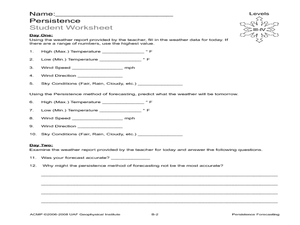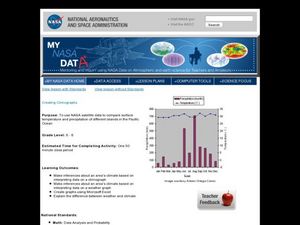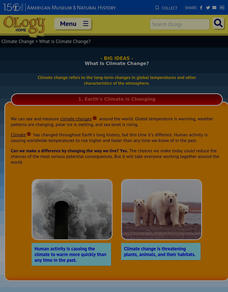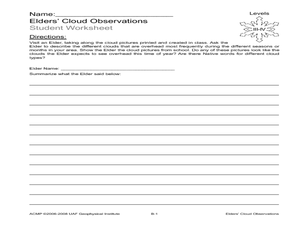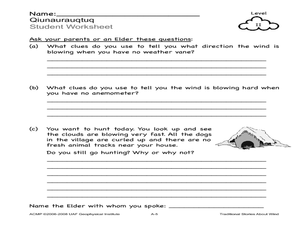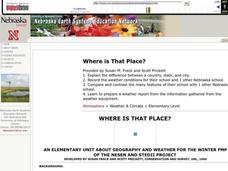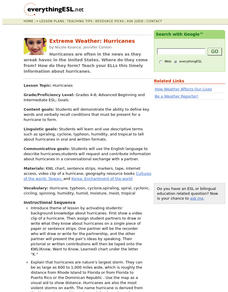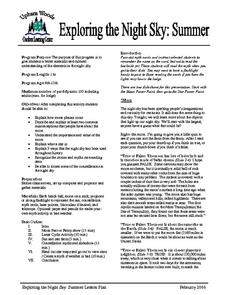Curated OER
Persistence Forecasting
Students study weather forecasting. In this weather lesson, students explore forecasting weather methods and do a forecast. Students study weather reports and discuss the elements of a forecast. Students study the method of persistence...
Curated OER
Climate Change in My City
Students investigate the climate changes occurring locally, regionally and globally over the last one hundred years. They brainstorm and predict whether the current year's weather was warmer or colder than last year then check the...
Curated OER
Creating Climographs
Students use satellite data to compare precipitation and surface temperatures on different islands. For this satellite lesson students create graphs and explain the differences between weather and climate.
Curated OER
Storm Clouds-- Fly over a Late Winter Storm onboard a NASA Earth Observing Satellite
Students study cloud data and weather maps to explore cloud activity. In this cloud data lesson students locate latitude and longitude coordinates and determine cloud cover percentages.
Curated OER
Temperature Conversions
Your young weather buffs use compositions and inverses of functions to convert between Celsius, Fahrenheit, and Kelvin degrees. Then they analyze possible compositions and whether they exist in the real-life context.
NOAA
Waves
Is it possible to outrun a tsunami? After watching a presentation that explains how waves and tsunamis occur, class members investigate the speed of tsunamis triggered by an earthquake.
Curated OER
History's Thermometers
Ancient coral beds give scientists clues to past ocean temperatures in much the same way that tree rings indicate historical weather conditions. High school scientists examine coral oxygen isotope ratios and plot the data as a function...
Curated OER
Winter Wonderland - Winter Olympics and the Water Cycle
After a concise introduction to the water cycle, junior meteorologists access NOAA's average snowfall data. They choose a city to examine in terms of precipitation. Then they look at historical snowfall data and use it to predict snow...
Space Awareness
Climate Zones
The climate at the equator is hotter than the climate at the poles, but why? The lesson goes in depth, explaining how the angles of illumination relate to the heating rate at different latitudes and seasons. Scholars use a strong lamp,...
American Museum of Natural History
What Is Climate Change?
So many factors show that climate change has arrived. Learners read through an online resource that explains the data and the consequences of climate change. They also review strategies for slowing or even reversing the global influence.
Curated OER
Elder's Cloud Observations
Students study cloud types and Native language terms for clouds and cloud types. For this cloud types lesson, students listen to a Native American speaker discuss clouds and the words used to describe clouds. Students complete a...
Curated OER
Physical Science Fun
Fifth graders explain how the land changes by developing some "land dances." Working in cooperative groups, each group develops a movement sequence that depicts the vocabulary word they are given. They teach dance to other classmates.
Curated OER
What is Climate?
Students explore the differences between climate and weather. In this introductory instructional activity of a climate unit, students discuss the vocabulary and concepts associated with weather and climate. They build their information...
Curated OER
What Will I Wear to School Today?
Learners describe the day's weather and observe their responses as they are written on the board. They brainstorm all different types of weather and how differences in weather determine what types of clothing we wear to school each day....
Curated OER
Traditional Stories about Wind
Students observe and talk about wind using no weather instruments. In this wind lesson plan, students use their senses to observe wind. They also interview an Elder about wind.
Curated OER
Creating Climographs
Students chart statistical information on graphs, interpret the information and use it to explain spatial relationships, and identify the relationship between climate and vegetation.
Curated OER
Town Growth and Immigration
Fourth graders describe how Michigan has changed and stayed the same over time. They explain reasons why people settled/settle in Michigan, then explain the role of geography on the settlement of Michigan.
Curated OER
Where Is That Place?
Pupils choose a school in their state to compare their weather to. They also describe the differences between country, state, and a city. They can make flashcards to help them remember the important terms and concepts.
Curated OER
Extreme Weather: Hurricanes
Students demonstrate the ability to define key words and verbally recall conditions that must be present for a hurricane to form.
Curated OER
Teaching the Tr'panier Trapezoid Kite
Students analyze how the parts of a system go together and how these parts depend on each other. They comprehend the forces in terms of strength and direction. Students observe, measure and describe weather indicators.
Curated OER
Exploring the Night Sky: Summer
Young scholars explain how moon phases occur. They describe and explain at least two common misconceptions that people have about the moon. Students explain what a star is. They explain 3 ways that the night sky has been used throughout...
Curated OER
Language Arts: Stylistic Devices
Students are able to define given literary terms, such as metaphor, simile, imagery, personification, symbolism, etc. They are able to identify the use of literary elements in a given text. Students are able to interpret weather...
Curated OER
El Nino
Students explain what El Nino is, where it is located and how it is created. They describe the weather changes caused by El Nino. They draw the patterns of El Nino on a world map. They predict economic effects El Nino has on the areas it...
Curated OER
Rock Cycles, Crayon Cycles
Students examine the rock cycle and the path that rocks go through to rearranged in different ways. They define key vocabulary terms, then in small groups conduct a variety of experiments using crayon shavings as simulated rocks and...


